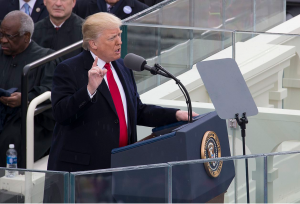 Many people are discussing passionately what the Trump era will look like. We should ask ourselves: what will happen to US policies on recovering stolen assets? Will the US administration continue in its anti-corruption efforts worldwide?
Many people are discussing passionately what the Trump era will look like. We should ask ourselves: what will happen to US policies on recovering stolen assets? Will the US administration continue in its anti-corruption efforts worldwide?
Although we should wait to see what happens, the premises are far from promising. Many have criticised the conflicts of interest within the new cabinet, with new members of the government holding close ties with the financial, oil and other industries and an overall net worth of over USD 13 billion – more than the GDP of 70 small countries. On 19th January, the new Secretary of the Treasury, Mnuchin, was questioned during his confirmation in Senate on his role as a director of an investment fund and offshore companies in the Cayman Islands and Anguilla. According to journalist investigations, Trump himself was involved in making business and partneringwith two firms accused of bribery in a bid for a casino license in tax haven Cyprus.
But internal problems aside, what did Trump promise and what can we expect? His electoral campaign hinged on “draining the swamp” of Washington’s bureaucracy and waste. In foreign policy, his promises of putting America first suggest that he will have a pragmatic – rather than values – based approach when dealing with dictators – and kleptocrats. Worringly, the US Congress is considering repealing a key anti-corruption law – the Dodd Frank Act – which requires oil and gas companies to publish payments they make to governments.
Over the last decade, the US has made some good steps in promoting and advancing stolen asset recovery. Since the creation of the “Kleptocracy Asset Recovery Initiative” under the Department of Justice in 2010 and the Foreign Corrupt Practices Act, 25 cases have been opened and brought against 20 foreign country leaders and officials, including Obiang, Abacha and Huerta, with up to USD 1.5 billion seized from US real estate and bank accounts – although only USD 120 million hase been actually recovered from those cases.
In 2015, Trump said that the law on Foreign Corrupt Practices is “horrible and it should be changed”. What this will mean for the US foreign policy in asset recovery is still unclear.
We should have a glimpse of his plans quite soon though: first, we will know in the near future if the new US administration is going forward with Obama’s plan to co-host the first Global Forum on Asset Recovery in Washington in July 2016. This intergovernmental conference would bring together Nigeria, Tunisia, Sri Lanka and Ukraine to discuss how to improve asset recovery with those countries holding stolen assets (CiFAR and its partners are working to make sure that civil society is represented and can raise its voice at the Forum). For now, we only know that the press release announcing the hosting of the GFAR on the Department of State website is no longer online.
Second, the Trump government will have to decide soon if it will continue negotiations with the government of Uzbekistan in the return process of $850 million in bribes paid in violation of the Foreign Corrupt Practices Act. The Bush and Obama administrations followed a policy which requires that assets can only be returned if in the originating countries governments take steps to curb grand corruption and the monies are used to improve the lives of ordinary citizens. Initiatives such as the BOTA Foundation in Kazakhstan were set up to do this. Experts and activists advised that if Trump repeals the policy of his predecessors, when the assets are returned they could end up in the hands of corrupt officials or terrorist organisations.
Policy changes such as these would not be the right decision. The US should continue to support initiatives against grand and transnational corruption, not only because it is the right thing to do, but because , with the instability, inequality and anger transnational corruption causes in societies, it is the pragmatic thing to do.
